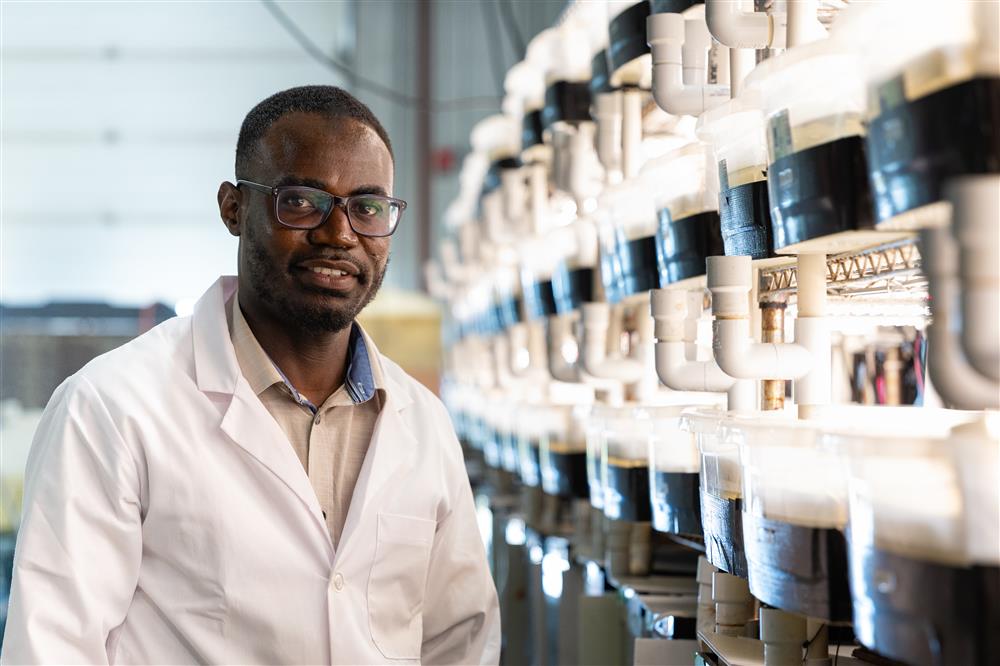Lethbridge Polytechnic researcher profile series: Dr. Emmanuel Nai
Tuesday, October 28, 2025
Reference: Press Release

For immediate release
Lethbridge Polytechnic researcher profile series: Dr. Emmanuel Nai
Oct. 27, 2025 – As innovation becomes increasingly ingrained in agricultural practices, researchers are finding new ways to balance growth and sustainability in a rapidly evolving industry. Dr. Emmanual Nai, research associate with Lethbridge Polytechnic’s Centre for Applied Research, Innovation and Entrepreneurship, is leading a project aimed at improving the sustainability of aquaculture operations with canola byproducts.

“As part of my PhD thesis, I developed a novel switchable stationary phase method for separating ionizable compounds in supercritical fluid chromatography,” says Nai. “In essence, it’s a type of filter that works well at separating the different parts of a chemical mixture. This process is called chromatography, where you separate compounds and mixtures to see what’s inside.”
Nai explains that chromatography is a type of laboratory technique used to separate, identify and quantify components in a mixture to get an accurate understanding of what comprises its chemical makeup. At Lethbridge Polytechnic, he now applies that analytical background to a field not often linked to agriculture — aquaponics.
“Toward the end of my PhD, I developed a passion for research and development and looked for opportunities that combined that passion with my analytical skills,” says Nai. “That’s when I found this opportunity at the polytechnic, where I am exploring the benefits and side-effects of supplementing fish food with canola meal, a byproduct of the canola oil extraction process. These meals, rich in plant protein, are incorporated into fish feeds and fed to fish that are part of an aquaponics system.”
The two-year, $300,000 project began last fall and is funded by the Canola Council of Canada, Alberta Canola, Sask Oilseeds, the Manitoba Canola Growers Association and the Government of Canada under the Sustainable Canadian Agricultural Partnership, a federal-provincial-territorial initiative. The goal is to explore the feasibility of a new market for Canadian canola products in the aquaculture industry, develop value addition for a canola processing by-product often considered waste, and provide valuable research opportunities for polytechnic researchers and students.
"Canola has many end-uses including food, feed and fuel, and we're always looking to develop new markets for our products, both domestically and abroad," says Chris Manchur, agronomist specialist and research lead for the Canola Council of Canada. "Supplementing fish feed with canola meal is a natural fit, and we're looking forward to Dr. Nai's work on how canola meal can be sustainable and economic source of nutrients for fish."
“Our agricultural partners face challenges at almost every turn,” says Nai. “By using our applied research capabilities, we are helping producers meet those challenges head-on while improving the sustainability of their operations.”
Now at the halfway point of his project, Nai is beginning to plot a future in agricultural research and analysis.
“I’ve enjoyed using my analytical instrumentation skills to benefit this research, along with state-of-the-art equipment in our lab,” he says. “Looking ahead, I want to analyze the nutritional benefits of plants, particularly those that haven’t been studied in depth. There is a lot of research that yields not just economic benefits, but positive impacts for producers.”
Lethbridge Polytechnic’s Centre for Applied Research, Innovation and Entrepreneurship (CARIE) directly engages in applied research projects that tackle real-world challenges with immediate and practical impacts. In partnership with industry, community organizations, researchers and students, CARIE's mandate is to deliver results that solve today’s problems and drive tomorrow’s innovation.
To learn more about applied research activities and projects at Lethbridge Polytechnic, visit: lethpolytech.ca/CARIE.
Media are invited to attend an availability with Dr. Emmanuel Nai for photo, video and interview opportunities.
When: 12 p.m., Monday, Oct. 20
Where: Centre for Sustainable Food Production (research greenhouse), Lethbridge Polytechnic
RSVP: Please RSVP to Sam Sasse if you plan to attend.
For more information, contact:
Sam Sasse (he/him)
Media Relations Specialist
Marketing, Communications and Web Services
W: 403-320-5267 C: 306-580-8732
CE 2315A, 3000 College Drive S., Lethbridge, AB T1K 1L6
We are Lethbridge Polytechnic. Learn more here.
Sign up to stay connected
- News
- Property Alerts
- Save your favourite properties
- And more!
Joining Farm Marketer is free, easy and you can opt out at any time.
